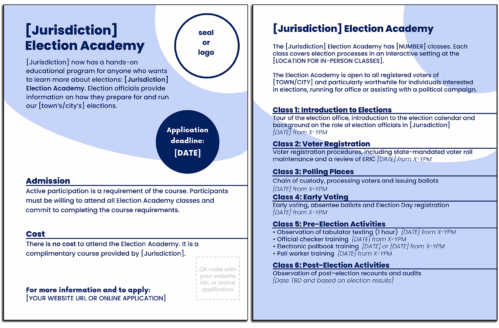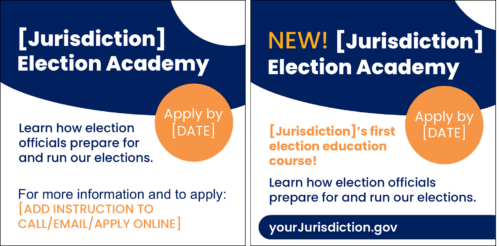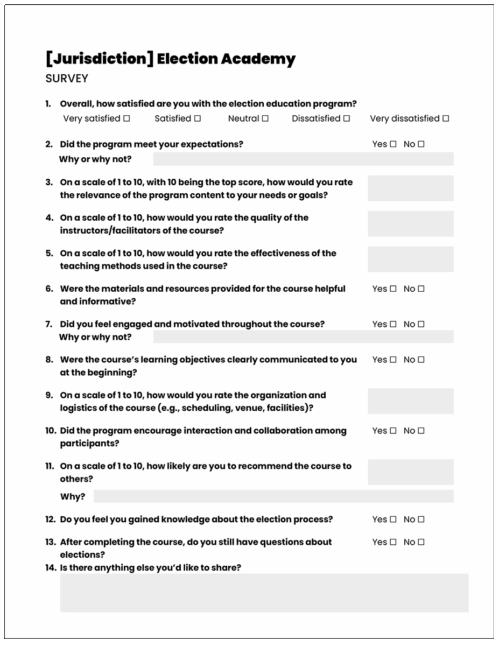September 26, 2025
Creating an Election Academy: Manual and Materials
Download the manual and materials:
Inspired by successful election education courses implemented in jurisdictions across the country, this manual and materials are designed to help you start, run and repeat an election academy—an election education course—in your jurisdiction.
An election academy is a hands-on course designed to provide participants with information on how election officials prepare for and conduct elections in their jurisdiction.
Why Start an Election Academy?
There are many reasons, but here are the top four:
- Promoting transparency: An educated electorate leads to a more transparent and accountable electoral process. By providing clear and accessible information about election administration, rules and procedures, election offices can help build trust and confidence in the electoral system.
- Enhancing voter confidence: A well-informed electorate is more likely to have confidence in the integrity of the electoral process. When voters understand how their votes are collected, counted and verified, they are less prone to misinformation or conspiracy theories that can undermine trust in elections.
- Increasing voter participation: Some eligible voters decline to participate in elections due to a lack of understanding about the process. By educating the public about registration, voting methods (in-person, mail-in or early voting) and important deadlines, election offices can help remove barriers to participation and encourage more people to exercise their right to vote.
- Fostering civic engagement: Education about election administration processes can contribute to a broader culture of civic engagement. When people understand how elections work, they are more likely to engage in other forms of civic participation, such as volunteering, running for office or becoming a poll worker.
Getting Started
The Creating an Election Academy Manual will guide you through four phases: developing, scheduling, running and concluding an election education course in your jurisdiction. The manual includes links to all templates and example materials, which you can customize for your town, city or state. Or access all materials at one time by downloading the zip file at the top of this page. See below to preview and download individual templates.
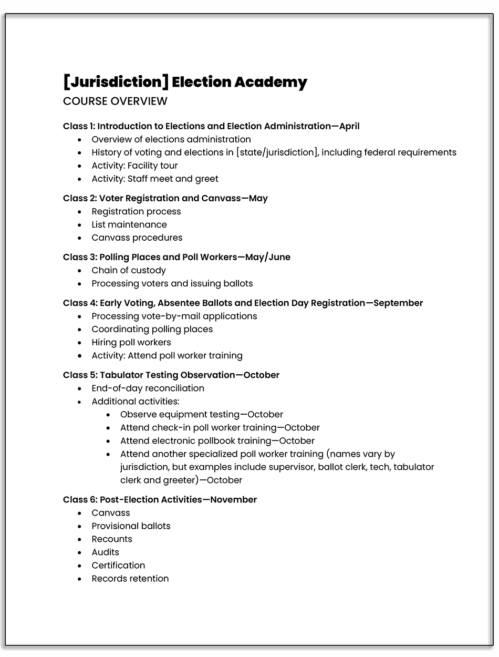 Course Overview Template (Word)
Course Overview Template (Word)
We include this example course overview to use as a template to determine what topics you will cover in your election academy and when. With your election calendar handy, add, delete and move topics until you find what will work best for your jurisdiction.
DOWNLOAD COURSE OVERVIEW TEMPLATE
Introducing and Promoting Your Election Academy
Once you’ve determined how many classes you’ll hold and set the dates, it’s time to tell people about your course and invite them to participate.
Course Introduction Flyer Template (PowerPoint)
Add your jurisdiction’s seal or logo, customize the colors and update the text to describe your election academy.
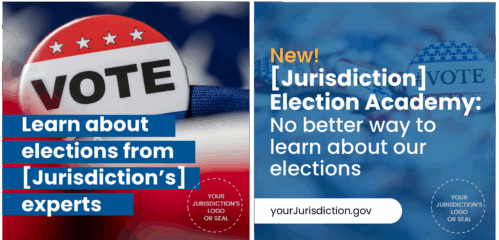 Course Introduction Social Media Graphic Templates (PowerPoint)
Course Introduction Social Media Graphic Templates (PowerPoint)
Add your jurisdiction and you’re ready to post on social media.
DOWNLOAD SOCIAL
MEDIA TEMPLATES
Course Introduction Website Graphic Templates (PowerPoint)
Promote your upcoming election academy on any website.
DOWNLOAD WEBSITE
GRAPHIC TEMPLATES
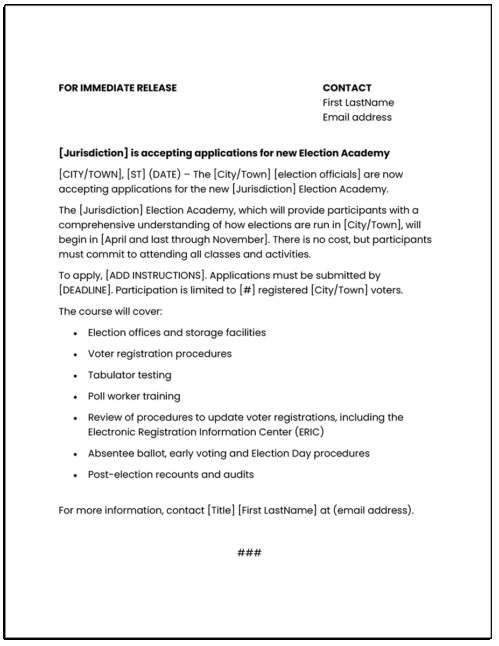 Course Introduction Press Release Template (Word)
Course Introduction Press Release Template (Word)
Update the text for your jurisdiction’s election academy, place on your letterhead and distribute to announce your new course.
DOWNLOAD PRESS RELEASE TEMPLATE
Enrolling and Communicating With Participants
There are different options for collecting application information, and the option or combination of options you choose will depend on what will work best in your jurisdiction, your access to technology and your outreach plans.
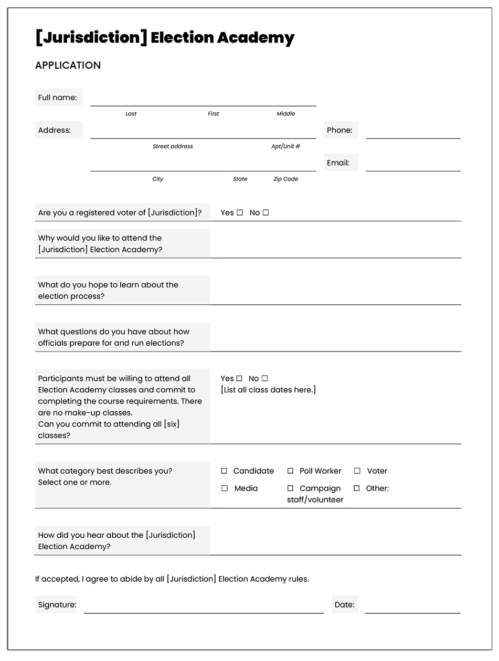 Course Application Template (Word)
Course Application Template (Word)
Here is an example application you can use as a starting point for your election academy application. You can customize and print applications, set up an online form based on this template or do both.
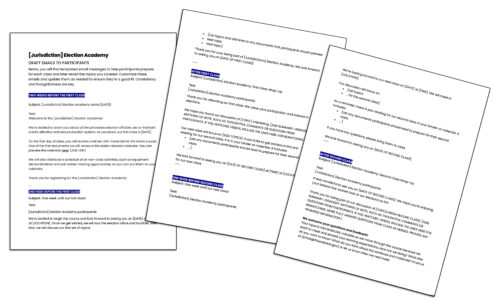
Use these templated emails to frame communications with your participants, from welcoming them to the course through sending them a warm thank you with a post-course survey.
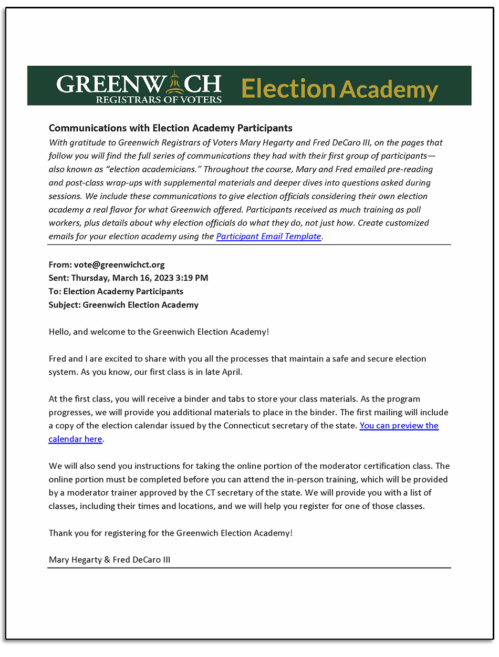 BONUS CONTENT: Read the email communications that Mary and Fred, registrars of voters in Greenwich, Connecticut, sent to Greenwich Election “Academicians” in 2024. They announced upcoming events, scheduled trainings, shared materials, requested feedback and followed up after thoughtful discussions. We spotlight the highly successful Greenwich Election Academy throughout the Creating an Election Academy Manual because it inspired these materials.
BONUS CONTENT: Read the email communications that Mary and Fred, registrars of voters in Greenwich, Connecticut, sent to Greenwich Election “Academicians” in 2024. They announced upcoming events, scheduled trainings, shared materials, requested feedback and followed up after thoughtful discussions. We spotlight the highly successful Greenwich Election Academy throughout the Creating an Election Academy Manual because it inspired these materials.
DOWNLOAD GREENWICH’S EMAILS
Wrapping Up and Following Up
Your course will no doubt be chocked full of information and hands-on activities. You’ll want to conclude by acknowledging your participants’ hard work and commitment and collecting feedback for continuous course improvement.
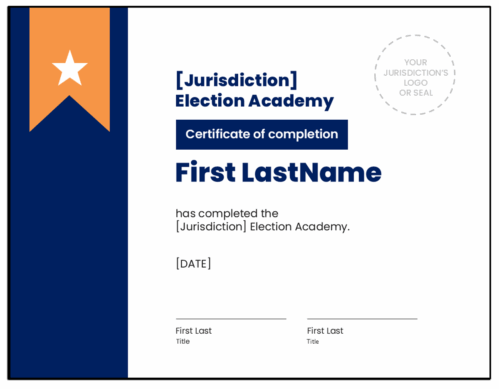
Add you logo or seal, adjust the colors, add text and print. You can distribute these during your last class or as part of a special celebration that follows.
Post-Course Survey Template (Word)
Ask participants to complete an exit survey to ensure your course is meeting the needs of voters in your jurisdiction. It’s an opportunity to review course materials, workload and overall satisfaction. Like the application, you could conduct your survey using a print or online format. These are example questions to serve as a starting point for your survey.
One Last Thing
As you plan your classes and select course materials, keep in mind the top reasons for starting your Election Academy:
- Promoting transparency
- Enhancing voter confidence
- Increasing voter participation
- Fostering civic engagement
With these in mind, you are sure to develop a course that benefits voters, candidates, election officials and democracy. You may even inspire a few future poll workers!
And as you gather feedback from participants with each course you run, you will be able to fine-tune your presentations and materials to enhance this learning opportunity.

